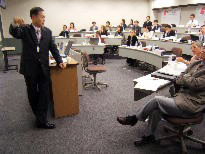Organizational Learning Capacities and Viable Evolution in an Emerging Market: A Study on the Withdrawals of Wal-Mart and Carrefour from the Korean Market
SeongMu Suh
Department of Business, Chung-Ang University
Jung Hee Lee
Department of Industry Economics, Chung-Ang University
Introduction

In May 2006, Wal-Mart and Carrefour pronounced their withdrawal from the Korean market after nine unsuccessful years. Since they were believed to face no serious competition from the beginning, the announcements were a bit surprise to many foreign and domestic analysts. Their story will certainly provide a valuable case for researchers in retail internationalization.
Industry experts' opinions - reported in major newspapers such as Chosunilbo and Hankook Kyungje - summarized the causes of such failure into three issues. First, the two foreign retailers failed to understand the local consumer's tastes. Subsequently, their store operations management such as product mix, store layouts and product presentation did not meet the expectation of local consumers. Secondly, given that agility was considered a must for any retailer to root in Korea. The geographic distance from the home office bounded the two expatriate CEOs from making swift and flexible decisions, contrary to the local CEOs -Third, they failed to develop healthy relationships with the local stakeholders. Carrefour was the worse of the two; it stubbornly insisted on its own policies in dealing with the local communities and employees, which resulted in bad publications. In summary, the two retail giants' failure is attributed to the CEOs who neglected their homework and insisted on their way of doing business.
However, placing blame on expatriate CEOs who attempted to transplant their own operation standards is an oversimplified endeavor to provide meaningful insights for managers and researchers in this field. The critical question is directed towards, whether or not an international retailer should take a complete localization strategy with local CEOs. The answer is certainly not a straightforward 'no' as there are many contradicting arguments that can easily be presented. For example, Wal-Mart and Carrefour are thriving in China even though the CEOs are from home offices and their store operation policies are not much different than that of Korea. COTSCO, the wholesale club merchant from the US leads another example after becoming quite successful maintaining their American CEO and management style. These examples show that we need a more convincing explanation for the two retail giants' failure in Korea that incorporates the unique competitive context of the two retail giants in Korea.
This paper proposes a conceptual model in an attempt to explain a viable evolution of a new retail format. The model includes concepts such as organizational learning and dynamic capabilities that are much discussed in organization behavior and strategic management fields. The discussion will be made in the following order: 1) The usefulness of the organizational learning theory in explaining the Korean retailers' evolutions in the last decade 2) proposed model and some research agenda to explain the failure of Wal-Mart and Carrefour in Korea, andlastly,3) discussion on some managerial implications
